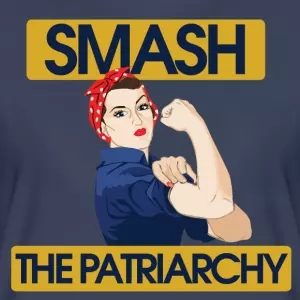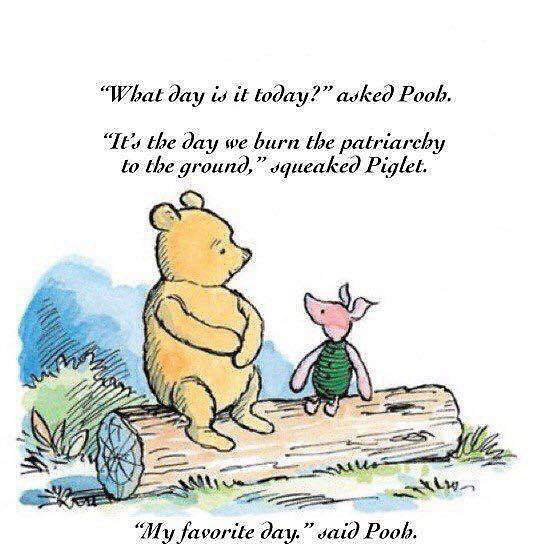 Assalaamu Alaykum wa Rahmatullahi wa Barakatuhu,
Assalaamu Alaykum wa Rahmatullahi wa Barakatuhu,
Jumping straight in: ISLAM IS A PATRIARCHY
Now some of you will be having a hard time accepting that statement, that’s OK so I am just leave it out there for now and going to ask you to read on and I’ll explain why I said it but for many of you, Islam = Good, Patriarchy = Evil.
If after reading this post you still disagree with me feel free to say so in the comments, write your own thoughts on it elsewhere, unfollow, or just generally be mean to me. Don’t worry I won’t cry and I grew up in a time when we were able to disagree without the need for anyone needing a safe place.

It’s pretty clear that in it’s use in academia, the media and the workplace that patriarchy has become this big, evil, dirty word in modern Britain, as well as the rest of the world. It shuts down discussion, prevents dialogue and I would argue stops us getting to the root of problems and having a go at solving them in matters of gender relations.
Sadly many Muslims including I assume some you who are reading this post have adopted this use of the word, and the ideas that follow from feminists along with other aspects of ‘progressive’ ideology from the media, fellow race / equality activists, education, especially higher education or just general society around us.
To see if you’re one of these people, read the following three statements and decide whether you agree with the traditionalist Muslim in the dialogue or the progressive one.
Traditionalist Muslim: “Sister’s shouldn’t travel without a mahram.”
Progressive Muslim: “That’s patriarchy!”
Traditionalist Muslim: “Hijab is about behavior not just what you wear.”
Progressive Muslim: “Don’t tell women how to behave or dress, that is patriarchy!”
Traditionalist Muslim: “Any woman who gets married without the permission of her guardian, her nikkah is invalid, her nikkah is invalid, her nikkah is invalid…”
Progressive Muslim: “How dare you tell women who they can or cannot marry, THAT’S PATRIARCHY!”
If you find yourself agreeing with our progressive Muslim brother in the above three dialogues then you have a problem, actually you have two problems. The first is you probably assumed it was a female making the argument, which is really sexist of you, shame on you and your sexist views as there are men and women on both sides of the discussion.
The second problem you have if you agree is that all of them in isolation are statements of truth, Islamic teachings which as a believer you should not be digressing from and the last is even a sahih hadith from the Prophet Muhammad (Sallallahu alayhi wa salam).
FROM THE DICTIONARY
Patriarchy has become the catch all, go-to term, used by feminists and their allies who have accepted feminist arguments to malign any male influence over any power structure, organization or idea in culture, politics, education or any other aspect of life.
According to prevailing feminist writers, “Patriarchy is the term used to describe societies like those we live today, characterised by current and historic unequal power relations between women and men whereby women are systematically disadvantaged and oppressed.”

OK, we can all be against oppression so doesn’t that make us all feminists and all against patriarchy?
Well no it doesn’t, because the actual dictionary definition of patriarchy is different to the one given above and allowing others to define words is a powerful tool, and changing the meaning of the terms prevents us coming to a common understanding between opposing views and prevents any chance of any form of reconciliation through dialogue or even arguments.
Patriarchy dictionary definition
noun
- a system of society or government in which the father or eldest male is head of the family and descent is reckoned through the male line.
- a system of society or government in which men hold the power and women are largely excluded from it.
- a society or community organized on patriarchal lines.
plural noun: patriarchies
On the first definition, yes Islam is guilty as charged, the man is amir of the household, lineage is tracked through the male line so if you have a problem with that you have a problem with Islam.
Abdullah ibn Umar reported: The Messenger of Allah, peace and blessings be upon him, said, “Every one of you is a shepherd and is responsible for his flock. The leader of people is a guardian and is responsible for his subjects. A man is the guardian of his family and he is responsible for them. A woman is the guardian of her husband’s home and his children and she is responsible for them. The servant of a man is a guardian of the property of his master and he is responsible for it. No doubt, every one of you is a shepherd and is responsible for his flock.”
Source: Sahih al-Bukhari 6719, Sahih Muslim 1829
On the second and third definitions, though we can argue there was a tradition of female Islamic scholarship and leadership in lower positions that we’ve lost to some degree and need to reestablish , still the role of leader of the nation, leader of each community based around the masaajid and the imam, leader of tribes and societies are men and rightly so.
Ibn Hazam reported in his book Maraatib al-Ijmaa’ that there was scholarly consensus on this point. In the section he says: “Out of all groups of the people of the Qiblah [i.e., all Muslim sects], there is not one that allows the leadership of women.” Al-Qurtubi reported something similar, and al-‘Allaamah al-Shanqeeti said, “There is no difference of opinion among the scholars on this point.”
Once again, if you have a problem with this you have a problem with Islam and you need to go check your emaan, reflect and see if you truly see Allah and His Rasool (Sallallahu alayhi wa salam) as your source of guidance in these matters because I don’t think you do if you wish to change them every time it clashes with one of your modernist view points.
CORRECTING THE MISOGYNY OF SOCIETY
So as for the rest of us Muslims, we’ll not be changing Islam to suit whatever the prevailing tendencies in society are from decade to decade.
Now if we’re going to have committees to run our institutions I’m all in favour of appointing women to these governing bodies as long as gender relation etiquette is observed as we need to listen to those voices, value their opinion and point of view but don’t come saying we need to appoint female imams, or try to say a woman can run the state or some such other modernist idea.
Muhammad (Sallallahu alayhi wa salam) and the rightly guided khulafa used to make shura (consultation) with the women, listening to their views, valuing those views as valid and worthy of consideration.
We adapt ourselves and our society to and around Islamic teachings, we do not change or bend Islamic norms to suit ourselves and our society and Imam Malik (Rahimahullah) was correct when he said:
“Nothing will rectify the last part of this Ummah except that which rectified its first part.” (i.e. the Book of Allah and the Sunnah of the Messenger of Allah Sallallahu alayhi wa salam)).
— Imam Malik (rahimahullah)
Reported by Ibn ‘AbdulHādi, in Tanqih at-Tahqiq 2/423
We should as believers stand firm in justice and truthfulness, standing up to the tyrants in people’s homes even, who are usually (but not always) men abusing their spouses, producing further dysfunctional people to raise more dysfunctional families of the future ummah.
O you who have believed, be persistently standing firm in justice, witnesses for Allah, even if it be against yourselves or parents and relatives. Whether one is rich or poor, Allah is more worthy of both. So follow not [personal] inclination, lest you not be just. And if you distort [your testimony] or refuse [to give it], then indeed Allah is ever, with what you do, Acquainted.
Quran translation, Surah an-Nisa (the chapter of Women, 4:135
Umar ibn al Khattab (Radiallahu anhu), the second khalifa, the one about whom Rasoolullah (Sallallahu alahi wa salam) said: “If there were to be a Prophet after me, it would be ‘Umar ibn al-Khattab” was a man who used to walk the streets day and night, and when he heard problems in people’s households he would deal with them justly, just as our Nabi (Sallallahu alahi wa salam) did in his time.
When we look at the examples of their lives, we see strong men able to deal justly with strong women taking a full role in accordance with their nature in society around them, not men feeling they can only be strong by forcing down women into a lesser role and the sooner we return to something like that as our target the better for us and the rest of society around us.
We see in the early days of Islam the natural role of women being valued, treasured and there are many evidences to attest to this such as the Sahabi being told to give good company to his mother three times more than his father.
Men are men, women are women. We are mentally, emotionally, physically different and we cannot change biology or ignore it, nor should we if we are true to ourselves.
The problem with feminism, especially second and third wave feminism is that it tries to force women to match men or even beat men at their game, rather than getting society to change to value and respect the role and nature of women. That would be true liberation.
MOVING FORWARD
Promoting the Islamic view point of the true role of women is the way to move forward, a constructive message of productive gender relations to those around us, as well as forbidding the evils of many men both within and without the Islamic community is the way we as Muslims need to go in combating misogyny.
You (true believers in Islamic Monotheism, and real followers of Prophet Muhammad and his Sunnah) are the best of peoples ever raised up for mankind; you enjoin Al-Ma‘roof (i.e. Islamic Monotheism and all that Islam has ordained) and forbid Al-Munkar (polytheism, disbelief and all that Islam has forbidden), and you believe in Allah.
Quran translation, Surah Al e ‘Imraan, 3:110
I say within as well as without the Muslim community, as we have to admit to have a problem and that as we’ve so many things we’ve strayed far from the Sunnah when it comes to gender relations and there is a middle path between the free mixing and other sins of the modernists and liberals and the almost absolute and total gender segregation practiced by most traditionalist and salafi communities here in the UK.
Likewise I cannot believe that our Nabi (Sallallahu alayhi wa salam) would allow the practices of marriage bandits, the wife beaters and oppressors, those who refuse to care, maintain and financially support their spouses to go unchallenged if he was with us today as many Imams and activists do by staying silent on these matters.
In this I would urge all the brothers and sisters out there to correct themselves, their families and the community around them. Many revert sisters speak of how they liked the Islamic viewpoint of women’s rights, sadly most of them are disappointed about how we practice that in reality in our daily lives and marriages.
If we can do this, then I believe there will be no reason for even non-Muslims to believe in feminism, never-mind Muslims and we can do it all through the Islamic system, a Patriarchy.
 Assalaamu Alaykum wa Rahmatullahi wa Barakatuhu,
Assalaamu Alaykum wa Rahmatullahi wa Barakatuhu,
